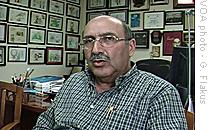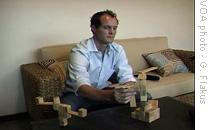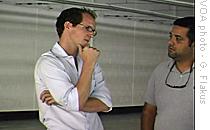Tegucigalpa, Honduras
09 July 2009
The forced removal of Honduran President Manuel Zelaya by his country's military on June 28 has left the Central American nation in a state of political turmoil. Already one of the poorest nations in the world, Honduras is now facing an even greater economic slowdown and possible sanctions and trade suspensions because of the action most outside nations regard as a coup d'etat.
Supporters of the interim government accuse President Manuel Zelaya of violating the constitution and say his removal was legal.
But Mr. Zelaya's supporters refer to interim President Roberto Micheletti as a gorilla who has taken power illegally. Both sides have now agreed to attend talks mediated by Costa Rican President Oscar Arias, but the political standoff could last for months.
Most Hondurans are caught in the middle, living under martial law conditions with nightly curfews and soldiers on the streets.
A construction worker named Marcial says there has been a slowdown in projects and he blames both sides. He says the politicians are all the same and that the strife is hurting his chances of finding work to feed his four children.
Some of the economic turndown here can be blamed on the worldwide recession and some on the political divisions that began when President Zelaya began implementing policies that alienated the business sector months ago. His removal by force, however, has made Honduras a pariah among regional nations. If the ousted leader is not allowed to return soon, many countries could impose trade sanctions and cut off aid to Honduras.
 |
| Eduardo Facusse |
Facusse says Honduras can count for help on its expatriots living in the United States.
He says the half million Hondurans living in the United States who send money home can help the country move forward.
Each year Honduran immigrants send around two and a half billion dollars in remittances to their homeland, but the recession has also affected their ability to save money to send.
Honduras is a poor country with 12 percent of its work force unemployed and over 30 percent underemployed. Many workers who supported Mr. Zelaya complain of being exploited for low wages here and say the rich people and those running factories should also pay more taxes, something the business leaders say would only hurt the economy more.
An important source of jobs is the twin plant or maquiladora sector that still employs over 100 thousand people in spite of the worldwide recession and the turmoil in Honduras. Maquiladoras are plants that bring in parts duty free from the United States and then export completed products back free of tariffs.
 |
| Chris Haughey |
A trade cutoff by the United States could dash his plans. Still, he remains optimistic. "So far we have not seen anything that tells us we should not be making this investment or that we should not be getting our factory up and running," he said.
 |
| Chris Haughey at factory site |
So Haughey, along with more than seven million Hondurans, is hoping the crisis will be resolved soon. The first meeting between President Arias, deposed President Zelaya and interim President Roberto Micheletti is set to take place Thursday in San Jose, Costa Rica.